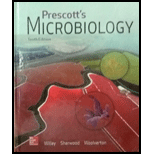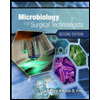
Prescott's Microbiology
10th Edition
ISBN: 9781259281594
Author: Joanne Willey, Linda Sherwood Adjunt Professor Lecturer, Christopher J. Woolverton Professor
Publisher: McGraw-Hill Education
expand_more
expand_more
format_list_bulleted
Concept explainers
Question
Chapter 41.3, Problem 3RIA
Summary Introduction
Aflatoxins are ringed and planar compounds. They intercalate between strands of deoxyribonucleic acids (DNA), causing cancer due to the frameshift mutation. Liver is the main site for these reactions where aflatoxins form unstable derivatives.
Expert Solution & Answer
Want to see the full answer?
Check out a sample textbook solution
Students have asked these similar questions
If using animals in medical experiments could save human lives, is it ethical to do so? In your answer, apply at least one ethical theory in support of your position.
You aim to test the hypothesis that the Tbx4 and Tbx5 genes inhibit each other's expression during limb development. With access to chicken embryos and viruses capable of overexpressing Tbx4 and Tbx5, describe an experiment to investigate whether these genes suppress each other's expression in the limb buds. What results would you expect if they do repress each other? What results would you expect if they do not repress each other?
You decide to delete Fgf4 and Fgf8 specifically in the limb bud. Explain why you would not knock out these genes in the entire embryo instead.
Chapter 41 Solutions
Prescott's Microbiology
Ch. 41.1 - What are some intrinsic factors that influence...Ch. 41.1 - How would the spoilage of bread differ from that...Ch. 41.1 - Why do sausage and other ground meat products...Ch. 41.1 - What extrinsic factors can determine whether food...Ch. 41.2 - MICRO INQUIRY Canned products such as vegetable...Ch. 41.2 - Describe the major approaches used in food...Ch. 41.2 - What types of chemicals can be used to preserve...Ch. 41.2 - What cellular component does HHP target? What is...Ch. 41.2 - How does nisin function? What bacterial genus...Ch. 41.2 - Prob. 5RIA
Ch. 41.2 - What are the major gases involved in MAP? How are...Ch. 41.3 - MICRO INQUIRY What foods are most prone to...Ch. 41.3 - What is the difference between a food-borne...Ch. 41.3 - What practical recommendations regarding food...Ch. 41.3 - Prob. 3RIACh. 41.3 - Members of what microbial genus produce fumonisins...Ch. 41.4 - MICRO INQUIRY Why is it important that PulseNet...Ch. 41.4 - How are most food-borne pathogens detected?Ch. 41.4 - Why is it advantageous to omit the pre-enrichment...Ch. 41.4 - How is PulseNet used in the surveillance of...Ch. 41.4 - How are most food-borne pathogens detected?Ch. 41.5 - Can you name at least two features that make these...Ch. 41.5 - What are the major types of milk fermentations?Ch. 41.5 - What are the major types of milk fermentations?Ch. 41.5 - What major steps are used to produce cheese? How...Ch. 41.5 - Prob. 1.4RIACh. 41.5 - Describe and contrast the processes of wine and...Ch. 41.5 - How do champagnes differ from wines?Ch. 41.5 - Describe how distilled spirits such as whiskey are...Ch. 41.5 - What microorganisms are most important in...Ch. 41.6 - What bacterial genera are often included in...Ch. 41.6 - How are probiotics used in agriculture?Ch. 41 - Compare the sell-by date of a package of hot dogs...Ch. 41 - You are going through a salad line in a cafeteria...Ch. 41 - Why were aflatoxins not discovered before the...Ch. 41 - What advantage might the Shiga-like toxin give E....Ch. 41 - Keep a record of what you eat for a day or two....Ch. 41 - During cheese production, LAB convert lactose to...Ch. 41 - Following recent outbreaks of E. coli O157:H7...
Knowledge Booster
Learn more about
Need a deep-dive on the concept behind this application? Look no further. Learn more about this topic, biology and related others by exploring similar questions and additional content below.Similar questions
- You implant an FGF10-coated bead into the anterior flank of a chicken embryo, directly below the level of the wing bud. What is the phenotype of the resulting ectopic limb? Briefly describe the expected expression domains of 1) Shh, 2) Tbx4, and 3) Tbx5 in the resulting ectopic limb bud.arrow_forwardDesign a grafting experiment to determine if limb mesoderm determines forelimb / hindlimb identity. Include the experiment, a control, and an interpretation in your answer.arrow_forwardThe Snapdragon is a popular garden flower that comes in a variety of colours, including red, yellow, and orange. The genotypes and associated phenotypes for some of these flowers are as follows: aabb: yellow AABB, AABb, AaBb, and AaBB: red AAbb and Aabb: orange aaBB: yellow aaBb: ? Based on this information, what would the phenotype of a Snapdragon with the genotype aaBb be and why? Question 21 options: orange because A is epistatic to B yellow because A is epistatic to B red because B is epistatic to A orange because B is epistatic to A red because A is epistatic to B yellow because B is epistatic to Aarrow_forward
- A sample of blood was taken from the above individual and prepared for haemoglobin analysis. However, when water was added the cells did not lyse and looked normal in size and shape. The technician suspected that they had may have made an error in the protocol – what is the most likely explanation? The cell membranes are more resistant than normal. An isotonic solution had been added instead of water. A solution of 0.1 M NaCl had been added instead of water. Not enough water had been added to the red blood cell pellet. The man had sickle-cell anaemia.arrow_forwardA sample of blood was taken from the above individual and prepared for haemoglobin analysis. However, when water was added the cells did not lyse and looked normal in size and shape. The technician suspected that they had may have made an error in the protocol – what is the most likely explanation? The cell membranes are more resistant than normal. An isotonic solution had been added instead of water. A solution of 0.1 M NaCl had been added instead of water. Not enough water had been added to the red blood cell pellet. The man had sickle-cell anaemia.arrow_forwardWith reference to their absorption spectra of the oxy haemoglobin intact line) and deoxyhemoglobin (broken line) shown in Figure 2 below, how would you best explain the reason why there are differences in the major peaks of the spectra? Figure 2. SPECTRA OF OXYGENATED AND DEOXYGENATED HAEMOGLOBIN OBTAINED WITH THE RECORDING SPECTROPHOTOMETER 1.4 Abs < 0.8 06 0.4 400 420 440 460 480 500 520 540 560 580 600 nm 1. The difference in the spectra is due to a pH change in the deoxy-haemoglobin due to uptake of CO2- 2. There is more oxygen-carrying plasma in the oxy-haemoglobin sample. 3. The change in Mr due to oxygen binding causes the oxy haemoglobin to have a higher absorbance peak. 4. Oxy-haemoglobin is contaminated by carbaminohemoglobin, and therefore has a higher absorbance peak 5. Oxy-haemoglobin absorbs more light of blue wavelengths and less of red wavelengths than deoxy-haemoglobinarrow_forward
- With reference to their absorption spectra of the oxy haemoglobin intact line) and deoxyhemoglobin (broken line) shown in Figure 2 below, how would you best explain the reason why there are differences in the major peaks of the spectra? Figure 2. SPECTRA OF OXYGENATED AND DEOXYGENATED HAEMOGLOBIN OBTAINED WITH THE RECORDING SPECTROPHOTOMETER 1.4 Abs < 0.8 06 0.4 400 420 440 460 480 500 520 540 560 580 600 nm 1. The difference in the spectra is due to a pH change in the deoxy-haemoglobin due to uptake of CO2- 2. There is more oxygen-carrying plasma in the oxy-haemoglobin sample. 3. The change in Mr due to oxygen binding causes the oxy haemoglobin to have a higher absorbance peak. 4. Oxy-haemoglobin is contaminated by carbaminohemoglobin, and therefore has a higher absorbance peak 5. Oxy-haemoglobin absorbs more light of blue wavelengths and less of red wavelengths than deoxy-haemoglobinarrow_forwardWhich ONE of the following is FALSE regarding haemoglobin? It has two alpha subunits and two beta subunits. The subunits are joined by disulphide bonds. Each subunit covalently binds a haem group. Conformational change in one subunit can be transmitted to another. There are many variant ("mutant") forms of haemoglobin that are not harmful.arrow_forwardWhich ONE of the following is FALSE regarding haemoglobin? It has two alpha subunits and two beta subunits. The subunits are joined by disulphide bonds. Each subunit covalently binds a haem group. Conformational change in one subunit can be transmitted to another. There are many variant ("mutant") forms of haemoglobin that are not harmful.arrow_forward
- During a routine medical check up of a healthy man it was found that his haematocrit value was highly unusual – value of 60%. What one of the options below is the most likely reason? He will have a diet high in iron. He is likely to be suffering from anaemia. He lives at high altitude. He has recently recovered from an accident where he lost a lot of blood. He has a very large body size.arrow_forwardExplain what age of culture is most likely to produce an endospore?arrow_forwardExplain why hot temperatures greater than 45 degrees celsius would not initiate the sporulation process in endospores?arrow_forward
arrow_back_ios
SEE MORE QUESTIONS
arrow_forward_ios
Recommended textbooks for you
 Biology Today and Tomorrow without Physiology (Mi...BiologyISBN:9781305117396Author:Cecie Starr, Christine Evers, Lisa StarrPublisher:Cengage Learning
Biology Today and Tomorrow without Physiology (Mi...BiologyISBN:9781305117396Author:Cecie Starr, Christine Evers, Lisa StarrPublisher:Cengage Learning Medical Terminology for Health Professions, Spira...Health & NutritionISBN:9781305634350Author:Ann Ehrlich, Carol L. Schroeder, Laura Ehrlich, Katrina A. SchroederPublisher:Cengage Learning
Medical Terminology for Health Professions, Spira...Health & NutritionISBN:9781305634350Author:Ann Ehrlich, Carol L. Schroeder, Laura Ehrlich, Katrina A. SchroederPublisher:Cengage Learning Biology: The Dynamic Science (MindTap Course List)BiologyISBN:9781305389892Author:Peter J. Russell, Paul E. Hertz, Beverly McMillanPublisher:Cengage Learning
Biology: The Dynamic Science (MindTap Course List)BiologyISBN:9781305389892Author:Peter J. Russell, Paul E. Hertz, Beverly McMillanPublisher:Cengage Learning Biology (MindTap Course List)BiologyISBN:9781337392938Author:Eldra Solomon, Charles Martin, Diana W. Martin, Linda R. BergPublisher:Cengage Learning
Biology (MindTap Course List)BiologyISBN:9781337392938Author:Eldra Solomon, Charles Martin, Diana W. Martin, Linda R. BergPublisher:Cengage Learning Microbiology for Surgical Technologists (MindTap ...BiologyISBN:9781111306663Author:Margaret Rodriguez, Paul PricePublisher:Cengage Learning
Microbiology for Surgical Technologists (MindTap ...BiologyISBN:9781111306663Author:Margaret Rodriguez, Paul PricePublisher:Cengage Learning

Biology Today and Tomorrow without Physiology (Mi...
Biology
ISBN:9781305117396
Author:Cecie Starr, Christine Evers, Lisa Starr
Publisher:Cengage Learning

Medical Terminology for Health Professions, Spira...
Health & Nutrition
ISBN:9781305634350
Author:Ann Ehrlich, Carol L. Schroeder, Laura Ehrlich, Katrina A. Schroeder
Publisher:Cengage Learning

Biology: The Dynamic Science (MindTap Course List)
Biology
ISBN:9781305389892
Author:Peter J. Russell, Paul E. Hertz, Beverly McMillan
Publisher:Cengage Learning

Biology (MindTap Course List)
Biology
ISBN:9781337392938
Author:Eldra Solomon, Charles Martin, Diana W. Martin, Linda R. Berg
Publisher:Cengage Learning

Microbiology for Surgical Technologists (MindTap ...
Biology
ISBN:9781111306663
Author:Margaret Rodriguez, Paul Price
Publisher:Cengage Learning
